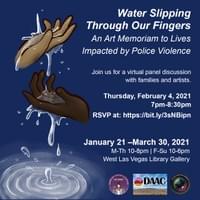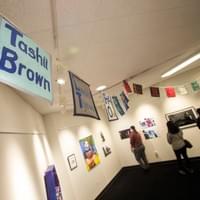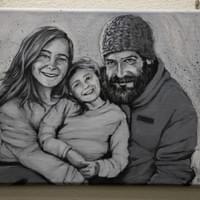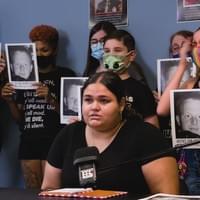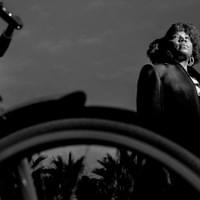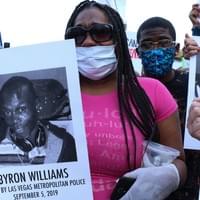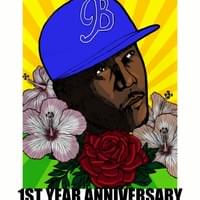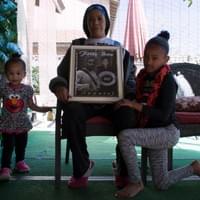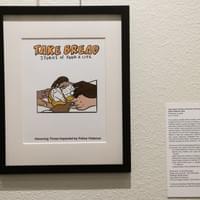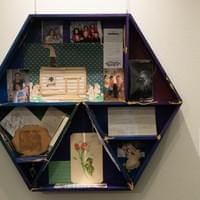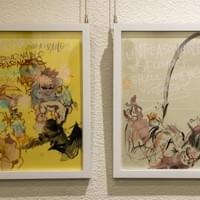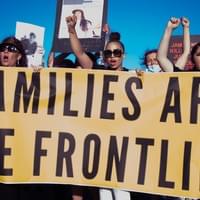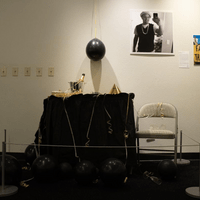

FTP
- Home
- About
- Art Memoriam
- Docuseries
- Gallery
- News & Features
- FTP Media Lab
- Story Archive
- Talks
- Media Spotlights
- Who We Are
The Forced Trajectory Project is a media, public relations, and advocacy organization documenting the rippling effects police violence has on communities beginning with families who have lost their loved ones to police murder. Utilizing moving pictures, stills, and sound, the project’s goal is to paint an intimate and accurate portrait of the “forced trajectory” these family members find themselves on after their loved one is killed.
- Welcome, and thank you for coming to experience our exhibit.
Las Vegas Locals should check the exhibit at the West Las Vegas Library, 951 W. Lake Mead Blvd, Las Vegas, NV 89106, Mon-Thur10AM-8PM, Fri-Sun 10AM-6PM from January 21, 2021 - March 30, 2021.
For our virtual audience there are two ways you can experience the exhibition. You can watch the Virtual Tour video at the top of the page and experience a curated version of the exhibition, or you can scroll down and explore the exhibit yourself.
Please watch the above video before going through the exhibit.
Alma Chavez mother of Rafael Olivas - shares the meaning behind the name of the exhibit. Alma was a witness to her son’s police murder on July 14, 2011 - which happened after Alma called 911 because Rafael was suffering from a mental health crisis. He was shot to death within minutes of the Las Vegas Metropolitan Police arriving. Video by Forced Trajectory Project, January 17, 2021. To prompt subtitles, press "cc" for closed caption at the bottom.
This art exhibit was made possible through the coalition effort of the Forced Trajectory Project, Families United 4 Justice Las Vegas, the Desert Arts Action Coalition and the West Las Vegas Library.
We invite you to take the time to learn about, absorb, and sit with these true accounts of police violence and the plight of those directly impacted in the Las Vegas Valley.
What you’ll find in this exhibit is the everyday reality of the everyday people impacted by everyday police violence. While the issue of police violence is often looked at as controversial, or thought of as a rare occasion, it is actually quite commonplace and ordinary, despite not receiving the media and community attention it desperately needs.
Statistics
On average, three to five people are killed by police nationwide, an estimated 1500 plus people per year. In 2020, independent researcher Rick Hill tabulated 2,063 deaths involving police - a record high in a year where we were asked to stay at home as much as possible. Police homicide is the sixth leading cause of death for young American men, and Black, Brown, and Indigenous people are exponentially more likely to be killed by police than other groups of people. Despite the national attention police violence has received over the last decade little has changed to curb or correct it. Volumes of case law including two historic Supreme Court cases serve as precedence to justify deadly use-of-force, and legislation like the Law Enforcement Officer Bill of Rights basically legalizes police violence. The average conviction rate for officers who take civilian life is less than .3%, meaning that out of a thousand police killings, maybe two or three officers will be held criminally accountable in some sense.
Introduction
Our work at Forced Trajectory Project (FTP) began twelve years ago in Brooklyn, New York. Originally a photography project, the idea was to illuminate the experiences of families impacted by police homicide. Today, Forced Trajectory Project is a media and public relations organization advocating for victims and survivors of police violence locally in Las Vegas and nationwide.
We founded FTP as a response to the lack of advocacy and support for those who have been brutalized by police or who have had the unfortunate and most devastating experience of losing a loved one in a police interaction. In investigating our initial cases we found alarming discrepancies in the narratives of those directly impacted and the narratives constructed by the media. As we immersed ourselves in New York’s directly impacted community, we established lifelong relationships with veteran family activists and organizers who by that time had already lived through the continuous rise and fall of the anti-police brutality movement since the 1990’s. It was time spent organizing, building, and sharing with them that we understood the necessity of our work: to counter the dominant narrative that is first controlled by the police and subsequently given to mass media for distribution through documenting the plight and struggle of those directly impacted, witnessing their resilience and untapped wisdom, and then sharing these critical narratives and lessons with the community at large to inform the movement to end police violence once and for all.
We cannot talk about this work without acknowledging those who created the foundation for our work, holding space for those directly impacted and cultivating their leadership through comradery, friendship and revolutionary love. The late Monica Shay, National Coordinator of the October 22nd Coalition, who spearheaded the Stolen Lives Project with the National Lawyers Guild and the Anthony Baez Foundation - the first civilian database archiving cases of police homicide across the nation, gave us her blessing to create the Forced Trajectory Project to serve as a supplement to the Stolen Lives Project. Monica was the glue for our impacted families in New York City and across the nation. We learned from her the actions and characteristics of a true advocate: Monica was one who cultivated trustworthy, long term relationships with families impacted by police violence, created organizing spaces for them where their ideas, experiences and knowledge could be sourced by the community, and organized events to uplift their loved ones’ stories and memorialize their legacies. Unfortunately in July of 2011, Monica, along with other members of her family were murdered. It was then that our work as media makers began to intertwine more intensely with advocacy.
The October 22nd Coalition family on the National Day of Protest to Stop Police Brutality, Repression and the Criminalization of a Generation, October 22, 2010, New York, NY. From left to right: Juanita Young, mother of NYPD homicide victim Malcolm Ferguson, Pierre Yurovski, Danette Chavis, mother of homicide victim Greg Chavis, Aidge Patterson, unknown, FTP co-founder Nissa Tzun (bottom center), the late Daniel "Majesty" Sanchez, Joann Mickens, mother of NYPD homicide victim Corey Mickens, the late Nicholas Heyward, Sr., father of NYPD homicide victim Nicholas Heyward, Jr., Margarita Rosario, mother of NYPD homicide victim Anthony Rosario and aunt of NYPD homicide victim Hilton Vega, the late Monica Shay, National Coordinator of October 22nd Coalition (bottom right), and Angel Seda (top right).
Families United 4 Justice
The suddenness of death is cold and callous. Monica’s unsuspected departing crumbled our organizing community. For many impacted families, their only trusted advocate had been violently taken away from them. It was now upon us younger organizers to engage our impacted community, but without Monica’s guidance. Shortly after her passing, the outspoken niece of NYPD homicide victim Alberta Spruill - Cynthia Howell - and I began brainstorming a new organization in service of impacted families and led by impacted families. In the fall of 2014, we were ready to launch this new organization and put a call out to our impacted network to attend the first initial meetings at the MayDay Space in Brooklyn, New York - a convergence organizing space that FTP co-founder Oja Vincent managed at the time. At these initial meetings, the families of police homicide victims Alberta Spruill, Nicholas Heyward, Jr., Agabus Wordsworth, Eric Garner, John Collado, Scott Eriksen, Willie Harper and Shantel Davis were present. Collaboratively and democratically they decided on the organization’s name, Families United 4 Justice (FU4J).
Over the next few years, Cynthia worked hard to expand FU4J’s network. Within New York state she had connected with well over thirty impacted families, and by 2016 the FU4J network reached across several states including New Jersey, Ohio, Missouri, Michigan, Maryland, Virginia, North Carolina and Georgia. In 2015 FTP relocated to Las Vegas where we immediately started identifying impacted families and advocating for them, introducing them into the FU4J network where some of them got the opportunity to travel to build with other impacted families. In the fall of 2016, Cynthia asked FTP to help FU4J organize a national gathering of impacted families. We agreed and worked with the Allied Media Conference to host the first FU4J national gathering at Wayne State University in June of 2017.
Loss is no stranger in this work, and the lesson of ‘tomorrow isn’t promised,’ is frequent and sobering. At the end of 2016, Cynthia’s health deteriorated quickly. She passed in May of 2017, a month before her vision of uniting impacted families materialized. As longtime friends and partners in this work, we knew the work of supporting impacted families had to continue.

The second Families United 4 Justice meeting. From left to right: Kalin Callaghan and her sons of the Willie Harper family (Black Panther Party member, killed by police), Danette Chavis, mother of homicide victim Greg Chavis, Virginia Morales, widow of Willie Harper, the late Cynthia Howell, niece of NYPD homicide victim Alberta Spruill, Cynthia's goddaughter Allison, Debra Schaefer, grandmother of Rebecca Schaefer (daughter of police homicide victim Scott Eriksen), Lisha Garner, sister of Eric Garner, friend of John Collado family, Ang Hicks, aunt of NYPD homicide victim Shantel Davis, unknown, Rebecca Schaefer, daughter of Suffolk County police homicide victim Scott Eriksen, Emboya Wordsworth, father of NYPD homicide victim Agabus Wordsworth, Amarilis Collado, widow of NYPD homicide victim John Collado, and the late Nicholas Heyward, Sr., father of NYPD homicide victim Nicholas Heyward, Jr. October 18, 2014. Photo by Nissa Tzun, Forced Trajectory Project
Since our relocation to Las Vegas we have identified and have advocated for over twenty local cases of police violence. Our Families United 4 Justice Las Vegas chapter has over forty members. Some of these members’ stories are featured in our exhibit here today.
George Floyd and the Sustained Platform
The year 2020 will live in infamy for all of history, but for many families impacted by police violence, it marks a year of mobilization and refocus on their cases. There is a level of suspense and anxiety that impacted families live with daily: the lack of justice in their cases is not only due to a corrupt system that refuses to hold itself accountable, but due to the general obliviousness and apathy from their communities - and when the topic of police murder elevates to breaking national news, families often recognize that small window of opportunity to engage the public and raise their voices about their loved one’s cases. A few cases per year captivate the nation via a barrage of media attention. However, the exponential majority of police murders barely receive mention in local news, remain unknown nationally, and media coverage typically regurgitates the police’s contrived narrative of incidents involving themselves. Like the killing of Eric Garner on July 17, 2014, George Floyd’s murder was also recorded in its entirety, and with the majority of Americans quarantined at home due to the coronavirus pandemic, Floyd’s death became the proverbial skeleton in America’s closet that keeps falling out. As the chant “Black Lives Matter,” filled the streets, many Americans were ready to listen with open ears to those directly impacted by police violence like they were never before.
And so, we mobilized. The year of 2020 for us was one of hyper response: Response to the emergence of a global pandemic, response to the growing American audience ready to listen and learn about police violence, and response to the needs of our directly impacted community.
Water Slipping Through Our Fingers
In the months after George Floyd’s murder, FTP met with several organizations who were interested in collaborating. After speaking to the Desert Arts Action Coalition (DAAC), we decided to introduce them to Families United 4 Justice Las Vegas and over several weeks and months the Water Slipping Through Our Fingers exhibit was planned. The exhibit is a result of these powerful exchanges between those directly impacted by police violence and talented, engaged artists who have committed their creativity to serve as a catalyst for social justice, and our documentary and journalism work in Las Vegas over the last five years.
We believe strongly in the transformative role art can play in times like these. Art has the ability to inform and invoke change. We hope that your time with us will invite you to stay engaged in the topic of policing and public safety in our community so that we can see real systemic transformation in our lifetime.
We encourage you to engage with our directly impacted community and our coalition - the following is our contact information:
Families United 4 Justice Las Vegas
Email: LV.FU4J@gmail.com
Desert Arts Action Coalition
Twitter.com/DAACVegas
Email: desertartsactioncoalition@gmail.comForced Trajectory Project
Website: forcedtrajectory.com
Facebook.com/ForcedTrajectoryProject
Instagram.com/forcedtrajectory
Email: forcedtrajectory@gmail.com
-Nissa Tzun, FTP co-founder
Stories, Installations
and Artist Statements
Get deeper into these stories in this section with narrative storytelling, photographs, artist statements, and pan shots of installations.
After the exhibit
Am important message for our audience after experiencing the
Water Slipping Through Our Fingers exhibit.
Thank you to all those who contributed to this powerful exhibit
Families United 4 Justice Las Vegas Members: Teena Acree, Amber Bustillos, Alma Chavez, Eric Farah, Trinita Farmer, Nina Fechner, Milu Gonzalez, Ariah Justin, Madison Keller, Skylar Keller, Jackie Lawrence, Nasha Myart, Cristina Paulos, LJ Radney, Carol Luke, Terry Rogaczewski, Marcia Wells, Tonya Banks, The Rex Wilson Family, Maria Tijerina, Jess Osborne
Desert Arts Action Coalition Members: Demecina Beehn, Erik Beehn, Emily Budd, Diane Bush, Ali Cashman, Rebecca Hanley, Daniel Hernandez, Sean Jones, Wendy Kveck, Erica Vital-Lazare, Jeff Scheid, Robin Slonina, Kate St-Pierre
Forced Trajectory Project Team Members: Carolina Chacon, Eduardo Rossal-Cabrera, Micajah Daniels, Rick Ledesma, Jordan O'Brien, Nissa Tzun, Oja Vincent
Artist Bios
Desert Arts Action Coalition Members
Demecina Beehn is a Las Vegas-based cultural producer and art administrator. Her interest and scholarship focuses on elevating art of underrepresented communities and creating safe spaces for intersectional dialogue and expression. She holds a M.A. in Museum and Exhibition Studies from the University of Illinois - Chicago and a B.F.A. from the School of the Art Institute of Chicago. She is currently Curator Special Projects and Programs for MGM Resorts Art & Culture.
Erik Beehn is an artist and educator based in Las Vegas, Nevada. Receiving his MFA from The School of The Art Institute of Chicago, his practice spans across installation, painting and object making, with an interest in material exploration. Beehn currently teaches at the University of Nevada, Las Vegas, and the founder and director of Test Site Projects, a fine art publishing house located in Las Vegas.
Drawing from a background in bronze-casting and paleontology, Emily Budd’s sculptural practice engages with the reformative reimagining of monuments, memorials and artifacts as a claim to radical place-making, documenting the material storytelling and ephemeral traces of necessary social change. Budd is currently based in Las Vegas where she teaches Sculpture at UNLV. Visit emilybudd.com
Diane Bush has been an activist artist since the Vietnam War. She is an internationally published and exhibited artist, and has won numerous awards for her work including a Nevada Arts Council fellowship and a nomination for the United States Artists award. he work is in the permanent collection of MOMA and The Tate, in London, England.
Rebecca Gabrielle is a Las Vegas-based multidisciplinary artist who uses video, ceramics, installation, and fabrication to intertwine personal artifacts, feminism, Camp, and personal mythology. She is often a curator, educator, and arts advocate and is currently working on her Masters of Public Administration at UNLV. Rebecca is a founding artist in the collective, grlrm and a member of Desert Arts Action Coalition (DAAC).
Dan Hernandez is a Las Vegas based mixed media artist and the education and programming assistant at the Marjorie Barrick Museum of Art. Receiving his BFA from UNLV, his art practice focuses on objects and how they play on our emotional and mental development. He is the creator of SOCIAL COMA zine and a core member of the Las Vegas street art collective Cult 33.
Sean Jones is a native of Las Vegas, Nevada. He graduated with a Bachelors of Art with an emphasis in painting from UNLV and received Graduate Licensure in Education from UNLV in 1996. Jones has been an Art Educator for the CCSD for over 20 years. He is Illustrator of the “Official Neon Museum Coloring Book;” a founding member, keyboard player, and cartoonist of the infamous 1990’s Las Vegas alternative band “Tippy Elvis.”
Jeff Scheid’s most recent photo-installation chronicled the history and day-to-day life of the Fallini family, owners of Nevada’s oldest working ranch. Titled “Ranching in the High Desert,” the series exhibited at the Nevada State Museum in Carson City and the Nevada State Museum in Las Vegas.
Robin Slonina is a multidisciplinary artist whose work includes bodypainting, sculpture, painting, installation and performance art. Much of her work is interactive, inviting the viewer to experience the art rather than simply observe it.
Kate St-Pierre has a long history of creating award winning, compelling, immersive work. St-Pierre’s voice was nominated for a 2004 NY Drama Desk Award for Music, she was the original singer for Le Reve and was the lead soloist in Ka, Cirque du Soleil. St-Pierre worked with renowned large-scale installation artist, Ann Hamilton. St-Pierre is the Artistic Director of, The LAB LV, an award winning, experimental, interdisciplinary theatre company in Las Vegas.
Erica Vital-Lazare is a professor of creative writing and Marginalized Voices in Dystopian Literature at the College of Southern Nevada and is the editor of the forthcoming Of the Diaspora, a series of revisiting classic Black works in literature with McSweeney’s Press. Their work together includes the photo narrative exhibit Obsidian Neon: Building Black Life in Las Vegas.
Families United 4 Justice Las Vegas Members
Milu Angelique Gonzalez is a performance artist and fashion designer. From drumming at the Latin Grammys for Spanish pop artist Alex Syntek to having fashion runway show at The Cosmopolitan, Milu enjoys sharing her creative soul with others. The audio piece presented in this exhibit has come to be her most personal creation by the loss of her brother Cesar Gonzalez, a homicide victim of police brutality.
Cristina Natsuko Paulos grew up in the San Fernando Valley in Southern California. She relocated to Las Vegas in 2002. She received her BFA from the California Institute of the Arts in the animation program in 2006. As an artist, she incorporates various techniques from her animation studies and applies them to her work creating impressions of movement. Her work focuses on that of mirror twin character and work based on life and female archetypes, as well as portraiture and imagery and subject matter drawn from life. Her work is focus on surrealist storytelling and often uses the media of painting, comic-illustration, puppetry, and animation. Paulos is also a burn and trauma survivor, mental health advocate and police brutality survivor. Often in her own work she reveals her personal journey to recovering, trauma and her own madness to sanity. She hopes to end the negative stigma of what it is to be “label” mentally ill and also hope to elevate others to break the stigmas. She also actively fights for safer cop interactions of policing, she’s pro-good cops in our communities. Paulos works as a professional sign artist and sign painter, comic artist, painter, puppet artist, art teacher and is a published illustrator.
Terry Rogaczewski is an LA native and in his young life he started saving small animals, baby birds that fell out of trees and even spent time rescuing dolphins and whales along the California coast, all while holding a job as an Paramedic Ocean Lifeguard. Terry has always taken an interest in helping others, it’s how his family raised him! Terry eventually started a new career with the National Park Service as a Park Ranger protecting America’s natural resources.
Oddly enough, Terry would survive a brutal Las Vegas shooting that would change the course of his life. Two Las Vegas Metro police officers shot at Terry 21 times while he was suffering from a medical emergency. After being gunned down by then framed by local police Terry miraculously survived to tell his story.
After a lifetime of service and compassion towards the well being animals, people and nature, Terry is seeking a pardon from the state of Nevada so he can wipe his record clean and return back to helping others!
Forced Trajectory Project Crew Members
Carolina Chacon is a Nevadan passionate about social, racial and environmental justice. She works as a strategy and communications consultant for nonprofits, but the real work is in fighting each day to make a better world possible for all of us.
Micajah Daniels is a Graduate Research Assistant at the University of Nevada, Las Vegas. She is passionate about eradicating poverty and improving health outcomes for her community.
Rick R. Ledesma is a self taught photographer who lives in Las Vegas. Originally from Oxnard, California, Rick spent the last couple of years living in Arizona where his interest in photography started. At the age of 30, he thought it would be a good idea to pick up a camera and document his travels. Documenting and meeting strangers along the way brought a new interest in visual storytelling. Now living in Las Vegas, Rick has teamed up with local organizations and nonprofits such as the Forced Trajectory Project to help spread awareness on local issues that the local media ignores and/or refuses to cover.
Jordan O'Brien is a writer, filmmaker and UNLV graduate based in Las Vegas. He joined the Forced Trajectory Project in 2017.
Eduardo David Rossal-Cabrera is an anthropological-photojournalist filled with nothing more than a passion for visually telling the stories of the masses. He has spent most of his twenties learning about the needs that go unfulfilled and has taken on the challenge of capturing the systemic issues that plague our country. Through hi photographs, he wishes to communicate stories of lives lived in this systematic riddled country in hopes of having a transformative change that we all can benefit and grow from.
Nissa D. Tzun is a media artist, journalist, educator, and community organizer. She co-founded the Forced Trajectory Project in 2009. Her work as a photojournalist covering the anti-war movement, the Palestinian right to return, and the anti-police brutality movement has been seen nationally and internationally.
Oja Vincent is a producer, DJ, educator and activist whose life work is to create, connect and be part of the global movement to build community through sound-based story-telling, production, performance and logical construction while dynamically passing the tradition onto the next generation. He is the co-founder of the Forced Trajectory Project.
wangdawg (wông|dôg) is an artist, musician, videographer, educator and activist based in Las Vegas. Recently, wangdawg has tried to use his skills to advance causes for social, economic and racial justice. wangdawg began working with the Forced Trajectory Project in the summer of 2020 as an organizer, graphic designer and videographer.


